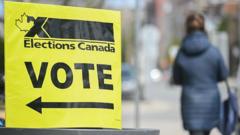In an unprecedented move, advance voting in Canada has seen a remarkable turnout of 7.3 million ballots, with significant implications for the upcoming federal election.
Record Early Voter Turnout in Canadian Elections with 7.3 Million Ballots Cast

Record Early Voter Turnout in Canadian Elections with 7.3 Million Ballots Cast
Canadian elections reach new heights as over 7 million advance ballots are cast, marking a significant increase in voter participation this year.
More than 7 million Canadians participated in advance voting this election cycle, setting a fresh record for early voter turnout, as reported by Elections Canada. Over the four-day advance polling period, which coincided with the Easter long weekend, there were reports of long queues at polling stations, with 2 million ballots cast on the very first day alone. With election day scheduled for April 28, federal leaders are intensifying their campaign efforts. Voters are faced with determining the governance of the country while navigating ongoing trade tensions with the United States, fueled by President Donald Trump's assertions about Canadian sovereignty.
Elections Canada announced that about a quarter of the 30 million eligible voters have already cast their ballots—an increase of 25% compared to early voting figures from the 2021 elections. Mail-in voting has also surged, with over 754,000 Canadians returning their special ballots, exceeding the 660,000 reported two years prior. Current polling indicates the Liberal Party holds a 5-point lead over the Conservative Party as the final campaign push intensifies.
Liberal leader Mark Carney is continuing his campaign efforts in various provinces, advocating for his party as the preferable choice against Trump's trade policies. Carney, a notable former central banker, criticized Conservative leader Pierre Poilievre for not having a clear strategy to confront the U.S. president's tariffs. The U.S. has imposed a blanket 25% tariff on Canadian goods, excluding those covered under the USMCA free trade agreement, which has already led to significant job losses in Canada's auto industry.
A victory for the Liberals would be a remarkable turnaround for the party, which was polling below 20% following the resignation of Justin Trudeau earlier this year. Meanwhile, Poilievre and the Conservatives focus their campaign on themes of change and economic concerns like housing affordability, crime rates, and the rising cost of living. Pointing to government spending, Poilievre asked, "It's time for the government to start pinching pennies," positioning his party as the beacon of change.
The Bloc Quebecois is positioned third in polls, advocating for Quebec's sovereignty, while the New Democratic Party appears to be lagging behind in fourth place as Canadians prepare to make pivotal decisions in the looming election.



















